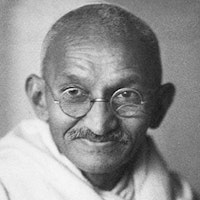Mental violence has no potency and injures only the person whose thoughts are violent. It is otherwise with mental non-violence. It has potency which the world does not yet know.
Mental violence has no potency and injures only the person whose thoughts are violent. It is otherwise with mental non-violence. It has potency which the world does not yet know.
Mohandas K. Gandhi

The World Does Not Yet Know
Topic: Overcoming Adversity
“Mental violence has no potency and injures only the person whose thoughts are violent. It is otherwise with mental nonviolence. It has potency which the world does not yet know. And what I want is nonviolence in thought and deed.”
Mohandas Karamchand Gandhi (born October 2, 1869, in Porbandar, in the Kathiawar region of present-day Gujarat – died January 30, 1948, in New Delhi) is revered worldwide as a moral and spiritual leader whose philosophy of nonviolent resistance profoundly shaped India’s struggle for independence. Raised in a devout Hindu household, Gandhi was formed by the religious pluralism of Gujarat, where Jain, Muslim, and Hindu traditions coexisted. After studying law at the Inner Temple in London, he traveled to South Africa in 1893 to work as a legal advocate. There, his encounters with racial discrimination and the injustices faced by Indian laborers awakened his conscience and inspired his lifelong commitment to satyagraha—steadfast adherence to truth through nonviolent action.
During his two decades in South Africa, Gandhi developed the principles that would define his life: nonviolence (ahimsa), civil disobedience, and the pursuit of self-rule grounded in moral discipline. Returning to India in 1915, he became a central figure in the movement for independence from British rule. Through peaceful protests, fasting, and broad programs of social reform, he worked to reshape not only political structures but the ethical character of society. He challenged caste discrimination, campaigned against untouchability, and encouraged simplicity, self-reliance, and the use of homespun cloth (khadi) as symbols of dignity and resistance. His mass movements—such as the 1930 Salt March—became landmarks in the global history of nonviolent struggle.
Gandhi’s life embodied a living synthesis of faith and action. Drawing wisdom from the Bhagavad Gita, the Sermon on the Mount, Jain ethics, and other religious traditions, he sought unity among faiths and dignity for all people. Though he was assassinated in 1948, his legacy endures as a moral compass for those seeking justice through peace. His life continues to testify that transformation begins within—and that courage, truth, and love remain among the most powerful forces for shaping a just society.
Wilson, Andrew, editor. World Scripture II. Universal Peace Federation, 2011, p. 1079 [Mohandas K. Gandhi].

Mohandas K. Gandhi
Copyright © 2017 – 2026 LuminaryQuotes.com About Us

Mohandas K. Gandhi
Gandhi’s Nonviolent Strategy and Martin Luther King, Jr.
Mahatma Gandhi provided the nonviolent strategy as well as the inspiration for Martin Luther King, Jr’s comparable civil rights movement in the United States.
–World Scripture II. Universal Peace Federation, 2011, p. 1079 [Mohandas K. Gandhi].